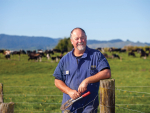OPINION: Animal diseases are associated with significant increases in livestock greenhouse gas emissions and land use, and reduced productivity. They also pose a threat to food security.
Animals suffer from various diseases, some of which can be fatal. Even non-fatal diseases have detrimental effects on animal welfare, productivity, and the livelihood of farmers. For instance, a cow that is ill may experience reduced milk production or become unsafe for meat consumption. This results in constrained supply chains, potential shortages for consumers and wasted investment and lost earnings for the farmer.
On the other hand, well-managed livestock can be expected to live longer, healthier lives – making them more productive and environmentally sustainable. Innovation in veterinary care has proven successful in improving the survival rates of livestock, which improves farmer returns and reduces greenhouse gas emissions. Taking preventative measures such as vaccinating or deworming offers greater productivity, which leads to higher farm incomes and more food availability for consumers.
A report by Oxford Analytica, commissioned by HealthforAnimals, provides a clear picture on the economic returns of taking preventative measures. Through better adoption of existing best practices and technologies, The Animal Health and Sustainability: a Global Data Analysis report, calculates that livestock could comfortably serve a world population of 9.8 billion by 2050 without increasing current emission levels. This reduced emissions intensity means livestock could meet the protein needs of an additional 1.6 billion people without increasing livestock’s overall GHG emissions level.
The findings are corroborated by other sources such as the Food and Agriculture Organization (FAO) of the United Nations, which estimates that ‘advanced genetics, feeding systems, animal health controls and other technologies over the past four decades allowed industrialised countries to reduce their overall land requirements for livestock by 20 per cent while doubling meat production’.
With climate change rising in importance globally, finding ways to limit and reduce the environmental footprint of animals in agriculture while continuing to feed a growing population will be a top priority. Improving animal health can increase livestock productivity and limit emissions.
The FAO estimates that livestock GHG emissions could be reduced by 18-30% by expanding use of existing best practices and technologies in animal health and husbandry.
Rates of food insecurity have been of concern in New Zealand for a long time, Covid- 19 and the associated increases in the cost of living have further exacerbated the problem.
The FAO and the World Health Organization reported that 14% of the New Zealand population was food insecure in 2018. With inflation rates and food prices increasing, the situation is getting worse. The New Zealand Government reported in 2021 that one in five children were living in households where food runs out.
Proper management of livestock can play an important role in addressing the world’s food needs. If herds are not properly managed, the loss of food output reduces the supply of food and the complete proteins and micronutrients available to people.
Increasingly we will need to turn to animal health technologies for the health of people, animals, and the environment.
Mark Ross is chief executive of Animal and Plant Health NZ.


















